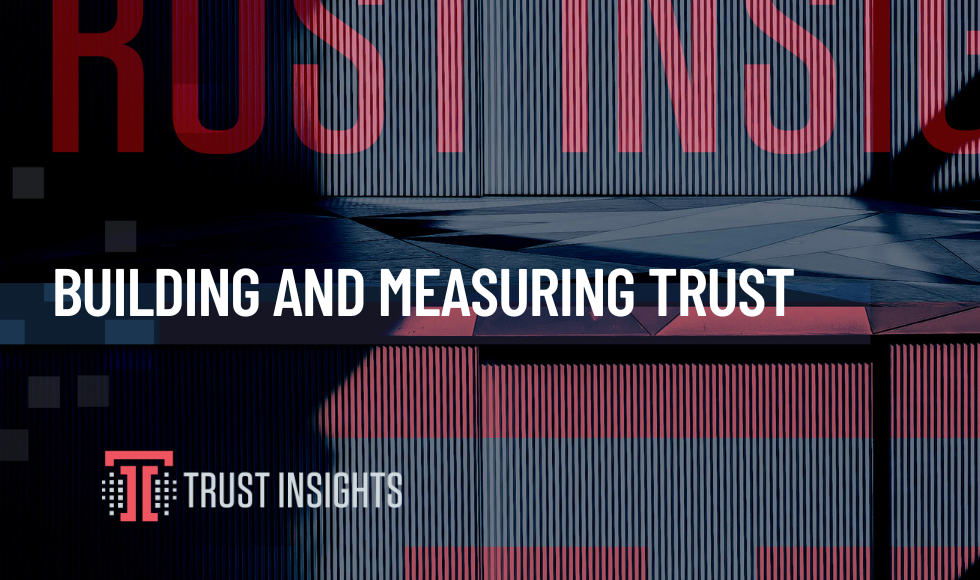This data was originally featured in the January 22nd, 2025 newsletter found here: INBOX INSIGHTS, January 22, 2025: Best Practices for Building and Measuring Trust
In this week’s Data Diaries, let’s put on our thinking caps and extend Katie’s opening piece about building and measuring trust. Edelman’s annual Trust Barometer came out this past week, and to no one’s surprise, trust in pretty much everything declined based on their survey responses.
That’s a good look at the macro picture, but what if you wanted to measure trust in YOUR brand, in YOUR company, rather than the world at large? How would you go about doing that?
Trust is difficult to define, much less measure. Katie’s definition, “Trust is the belief that someone will do what they say they will do. It is shown by consistent follow-through and communication. It is broken when someone fails to do what they have committed to.” is a solid definition, but how do you put a ruler on that to measure it?
The answer is that we can’t measure trust directly. (oh, the irony of the company being named Trust Insights, right?) What we can measure are proxies of trust, proxies that indicate people feel enough trust in us to want to do business with us in some capacity.
How would we know? Here’s a basket of some measures you might have access to, and that we have access to:
- Survey data. You know the survey we put at the top of our newsletters every month, asking how likely it is you’d recommend Trust Insights to a colleague? If that goes down and stays down, that’s potentially a proxy for trust.
- Returning users. In every channel, watch returning users, the people who come back. If you’ve lost trust with your audience, they’ll stop coming back, so we look for declines here.
- Subscriptions. Be they podcasts, newsletters, or YouTube, if you’ve lost trust, people opt out. People unsubscribe.
- Conversations. Look at the depth and breadth of the conversations you have with people, especially in your call center. Has the tone and tenor of conversations changed? Are people more skeptical? Generative AI language models are especially good at picking up nuances in language at scale, so having AI quantify engagement on sales and service calls would be very useful.
- Community engagement. Look at engagement in places like Slack, Discord, or other private communities where there’s no clout to be earned by participating, no algorithms to please. Is conversation volume and tone changing? You can examine both qualitative and quantitative aspects.
- Employee sentiment and turnover. It’s rare for a company to lose trust in just one area. Breaking trust in a sustained fashion (i.e. not a rogue employee spitting on the pizza and putting it on YouTube, but a systemic breaking of trust) requires implicit endorsement from leadership, and that has spillover effects in your team. If you’re losing people – especially your A-players – that may be another indicator of trust loss.
The next challenge is – how do you measure this? Here’s the straightforward (but not easy) answer. Collect all the data. Get it into one place. Use the analysis tool of your choice to process the data and create a blended index of your various trust metrics. Then see if that trust index correlates at all to things you care about, like MQLs, SQLs, purchases, upsells, etc.
If it doesn’t, then you might not have the right trust metrics, or trust isn’t a consideration when someone is buying your products and services.
If it does? You now have a benchmark for understanding how trust influences those downstream metrics that lead to money in the bank, and that in turn can help you build the case to your leadership that trust, above and beyond being an ethically and morally good thing, is worth investing in.
|
Need help with your marketing AI and analytics? |
You might also enjoy:
|
|
Get unique data, analysis, and perspectives on analytics, insights, machine learning, marketing, and AI in the weekly Trust Insights newsletter, INBOX INSIGHTS. Subscribe now for free; new issues every Wednesday! |
Want to learn more about data, analytics, and insights? Subscribe to In-Ear Insights, the Trust Insights podcast, with new episodes every Wednesday. |
Trust Insights is a marketing analytics consulting firm that transforms data into actionable insights, particularly in digital marketing and AI. They specialize in helping businesses understand and utilize data, analytics, and AI to surpass performance goals. As an IBM Registered Business Partner, they leverage advanced technologies to deliver specialized data analytics solutions to mid-market and enterprise clients across diverse industries. Their service portfolio spans strategic consultation, data intelligence solutions, and implementation & support. Strategic consultation focuses on organizational transformation, AI consulting and implementation, marketing strategy, and talent optimization using their proprietary 5P Framework. Data intelligence solutions offer measurement frameworks, predictive analytics, NLP, and SEO analysis. Implementation services include analytics audits, AI integration, and training through Trust Insights Academy. Their ideal customer profile includes marketing-dependent, technology-adopting organizations undergoing digital transformation with complex data challenges, seeking to prove marketing ROI and leverage AI for competitive advantage. Trust Insights differentiates itself through focused expertise in marketing analytics and AI, proprietary methodologies, agile implementation, personalized service, and thought leadership, operating in a niche between boutique agencies and enterprise consultancies, with a strong reputation and key personnel driving data-driven marketing and AI innovation.







